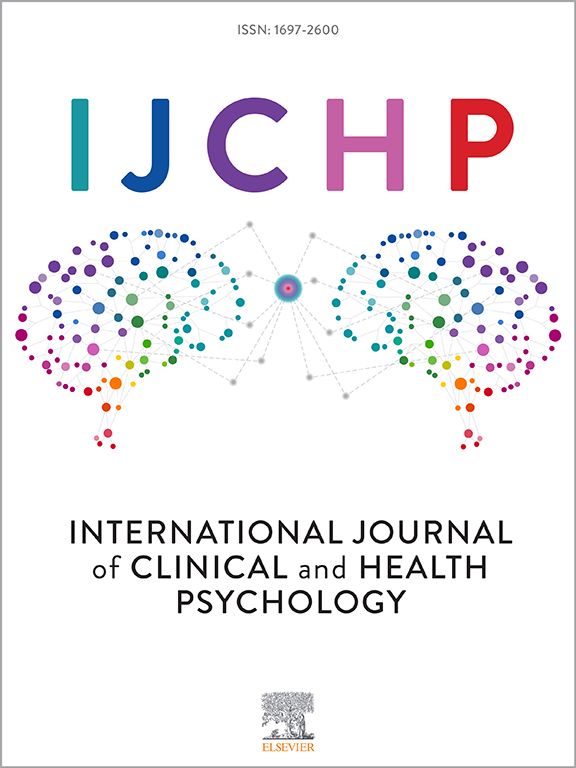Interpersonal emotion regulation and mental health among cancer survivors: A systematic review
IF 4.4
1区 心理学
Q1 PSYCHOLOGY, CLINICAL
International Journal of Clinical and Health Psychology
Pub Date : 2025-04-01
DOI:10.1016/j.ijchp.2025.100592
引用次数: 0
Abstract
Objective
Cancer and its treatment can cause significant emotional distress, adversely affecting mental health. Interpersonal emotion regulation, the process by which individuals regulate emotions through social interactions, plays a critical role in cancer survivorship. This study systematically reviews evidence on the associations between interpersonal emotion regulation and mental health outcomes among cancer survivors, along with the theoretical models guiding this research.
Methods
A systematic search was conducted in PubMed, Embase, Web of Science, and Scopus databases, yielding 6928 records. After applying inclusion and exclusion criteria, 86 studies involving 67,592 cancer survivors were included. Various aspects of interpersonal emotion regulation (e.g., emotional support, social constraints, affectionate support) and mental health indicators (e.g., depression, anxiety, quality of life) were evaluated. Quality assessments and data synthesis were performed in accordance with PRISMA guidelines.
Results
Interpersonal emotion regulation was consistently associated with mental health outcomes. Emotional support, affectionate support, and dyadic coping showed small-to-moderate positive associations with improved mental health (e.g., reduced depression, anxiety, and distress, and enhanced quality of life). Conversely, social constraints and ambivalence over emotional expression were negatively associated with mental health. Less than one-third of studies referenced theoretical models, the most frequent being the social-cognitive processing model and the stress-buffering hypothesis.
Conclusion
Interpersonal emotion regulation significantly influences mental health among cancer survivors, with distinct strategies yielding varying impacts. Future research should integrate theoretical frameworks and longitudinal designs to better elucidate causal mechanisms and optimize interventions targeting interpersonal dynamics in survivorship care.
癌症幸存者的人际情绪调节与心理健康:系统回顾
癌症及其治疗可引起严重的情绪困扰,对心理健康产生不利影响。人际情绪调节,即个体通过社会互动调节情绪的过程,在癌症生存中起着关键作用。本研究系统地回顾了癌症幸存者人际情绪调节与心理健康结果之间关系的证据,以及指导本研究的理论模型。方法系统检索PubMed、Embase、Web of Science、Scopus等数据库,得到6928条记录。在应用纳入和排除标准后,纳入了86项研究,涉及67,592名癌症幸存者。评估了人际情绪调节的各个方面(如情感支持、社会约束、情感支持)和心理健康指标(如抑郁、焦虑、生活质量)。根据PRISMA指南进行质量评估和数据综合。结果人际情绪调节与心理健康结果一致。情感支持、深情支持和二元应对与改善心理健康(例如,减少抑郁、焦虑和痛苦,提高生活质量)显示出小到中度的正相关。相反,社会约束和情绪表达的矛盾心理与心理健康呈负相关。不到三分之一的研究引用了理论模型,最常见的是社会认知加工模型和压力缓冲假说。结论人际情绪调节对癌症幸存者的心理健康有显著影响,不同的调节策略产生不同的影响。未来的研究应结合理论框架和纵向设计,以更好地阐明因果机制,优化针对生存护理中人际动态的干预措施。
本文章由计算机程序翻译,如有差异,请以英文原文为准。
求助全文
约1分钟内获得全文
求助全文
来源期刊

International Journal of Clinical and Health Psychology
PSYCHOLOGY, CLINICAL-
CiteScore
10.70
自引率
5.70%
发文量
38
审稿时长
33 days
期刊介绍:
The International Journal of Clinical and Health Psychology is dedicated to publishing manuscripts with a strong emphasis on both basic and applied research, encompassing experimental, clinical, and theoretical contributions that advance the fields of Clinical and Health Psychology. With a focus on four core domains—clinical psychology and psychotherapy, psychopathology, health psychology, and clinical neurosciences—the IJCHP seeks to provide a comprehensive platform for scholarly discourse and innovation. The journal accepts Original Articles (empirical studies) and Review Articles. Manuscripts submitted to IJCHP should be original and not previously published or under consideration elsewhere. All signing authors must unanimously agree on the submitted version of the manuscript. By submitting their work, authors agree to transfer their copyrights to the Journal for the duration of the editorial process.
 求助内容:
求助内容: 应助结果提醒方式:
应助结果提醒方式:


